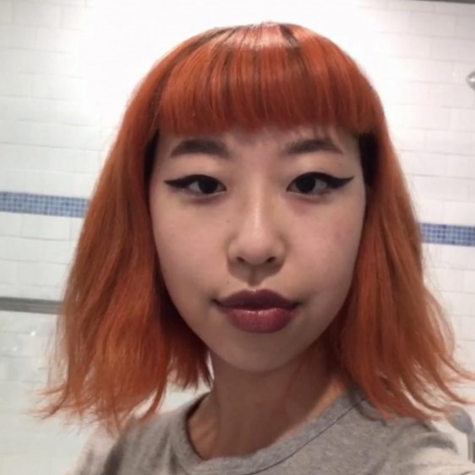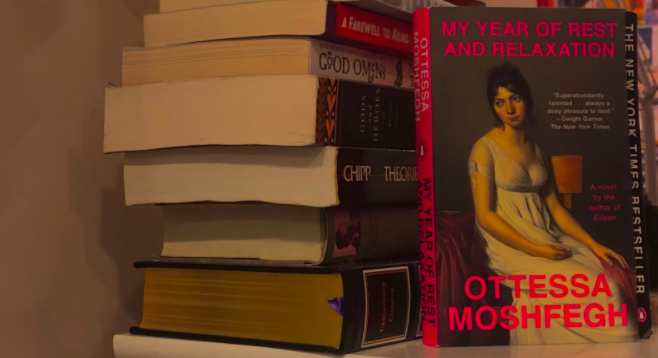What “My Year of Rest and Relaxation” teaches us about capitalism in isolation
Editor’s note: The following is an opinion article. The opinions presented are the writer’s own and are not representative of the Trailblazer newspaper staff or Pascack Hills High School.
Isolated in quarantine due to coronavirus precautions, I recently found the time to indulge in Otessa Moshfegh’s critically acclaimed 2018 psychological disturber, My Year of Rest and Relaxation. The story follows Moshfegh’s nameless 25-year-old protagonist, a woman muddling through the grossly misplaced positivity of pre-9/11 New York City; in an absurd quest for self-help and recovery, she attempts, using various prescription drugs, to sleep for an entire year.
An obvious connection was forged between fiction and reality, as the protagonist locks herself away in the ivory tower of her Upper East Side apartment, numbing herself to the desperate cries of the repulsion of life below with fixes of Benadryl and Nembutal. I couldn’t help but see how we all are now forced to relate, as we pass our days banally in total isolation. Pascack Hills student Elliott Kim adds that neither he nor his close friends “even leave the house anymore” and that he remains “on his phone for the entire day.” We reach for quickly satisfying entertainment to soothe the hole our once gregarious lives once filled.
But Moshfegh’s protagonist would say from her comfortably depressing state of near-constant blackout that these “before” lives were nothing but solipsistic slop forced down our throats by a cruelly capitalistic society that only serves to benefit from our human interaction. It might even be easier at first to accept the warped viewpoint that she circulates through the beginnings of her narrative regarding isolation: that the psychological damage endured is all some self-righteous ritual that will eventually metamorphose one’s soul.
However, her borderline obsessive pharmaceutical usage emphasizes her error in believing that physical isolation could free her from the fetters of capitalism and from the terrors of her own apathy. The fictional drug Infermiterol, which causes three days of long, notably forgotten blackouts and is used heavily by the narrator in her sleeping endeavors, is the wedge that Big Pharma drives into the narrator’s attempts at peace. The capitalistic grip of Infermiterol represents how even in the complete alienation of our own homes, we still are unable to escape corporate greed.
Recently, the troubled state of the American economy has directed our attention to the conflict of social distancing versus corporate pressure to continue to labor for an executive’s benefit. President Donald Trump expressed a wish to “reopen” the country by Easter for the influx of capital benefit, despite health officials’ warnings that isolation is key to defeating the virus. This exemplifies the constant, oppressive hold that greed has in our lives even in a quarantine. In a truly Moshfeghian development that almost ironically delivers our upsetting reality, the president appears to choose financial gain over human life.
A Pascack Hills Junior comments that the suggestion was “a heartless and truly disgusting” one that “showed how far we’re willing to go just for more money”. In a strikingly similar situation to the one that Moshfegh’s character hazily straggles through, the looming question hangs above us: How do we eliminate capitalism from our isolated lives?
In My Year of Rest and Relaxation, it is as easy as emerging from a pillowed chrysalis, blinking into the sun like a newborn babe, a transformation suddenly underway. Finished with Infermiterol and sleep one year later, the narrator begins a new lease on life, her pessimistic self, as well as her dependence on materialism and capitalistic interjections, shed with the sheath of the blanket. As she stumbles through the Met, she places her hand directly on an on-display canvas to prove to herself that “there was no God stalking [her] soul. Time was not immemorial. Things were just things.”
Could it all really be that easy? Could a simple rejection of capitalistic perturbation eliminate its control over our lives? Perhaps. Maybe paired with an economically devastating isolation period, a collective repudiation of the manic system that commands us could cease just as how its influence withered away for the protagonist. Americans can finally emerge from their numbing slumber, free from the shackles of greed, and step into the sunlight wide awake.

Claudia Kim is a senior at Hills and is excited to be working on the Trailblazer as an editor this year. Claudia edits for the Opinion section, a part of the paper that gives Hills students a place to be heard.
Fun Fact: Kim's favorite book is The Idiot by Elif Batuman.












































